Embark on a captivating journey into Vocabulary Level F Unit 2, where wordsmithery takes center stage. Prepare to expand your lexical repertoire and delve into the intricacies of language.
Within this unit, you’ll encounter a treasure trove of vocabulary words, their meanings, and their intricate relationships. Through engaging examples and interactive exercises, you’ll master the art of using these words effectively in diverse contexts.
Vocabulary List: Vocabulary Level F Unit 2
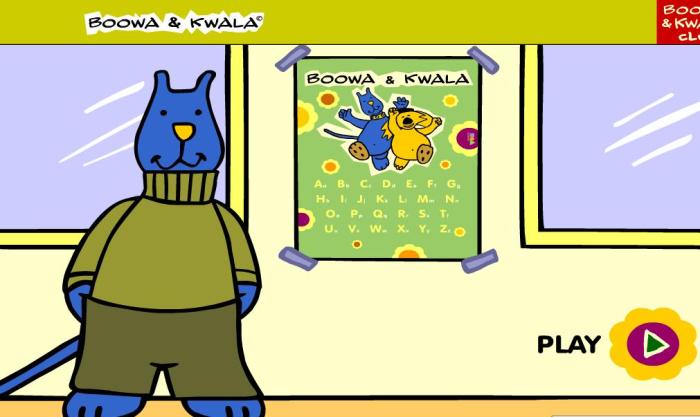
Unit 2 of Vocabulary Level F introduces a range of essential words that will enhance your vocabulary and communication skills. This comprehensive list provides definitions, synonyms, and antonyms for each word, organized alphabetically for your convenience.
Words and Definitions
- Abbreviate(verb): To shorten a word or phrase by using only the first few letters.
- Abundant(adjective): Present in large quantities or amounts.
- Accessible(adjective): Easy to reach or obtain.
- Acquire(verb): To obtain or come into possession of something.
- Admiration(noun): A feeling of great respect and approval.
- Adversity(noun): A difficult or unfortunate situation.
- Affluent(adjective): Wealthy or prosperous.
- Aggravate(verb): To make a situation or problem worse.
- Alien(adjective): Not belonging to a particular place or group.
- Allude(verb): To refer to something indirectly or briefly.
Usage Examples

Let’s delve into some practical examples to solidify your understanding of the vocabulary words from Unit 2.
By examining these sentences, you’ll not only enhance your comprehension but also develop a knack for using these words effectively in your own writing and speech.
Exemplify
- The teacher exemplifiedthe concept of photosynthesis by showing us a real plant.
- The chef exemplifiedher culinary skills by creating a delectable dish that tantalized our taste buds.
- The scientist exemplifiedthe principles of physics by conducting an experiment that proved the law of gravity.
Fluster, Vocabulary level f unit 2
- The sudden question flusteredthe student, causing her to stumble over her words.
- The unexpected compliment flusteredthe shy girl, making her blush and stammer.
- The intense pressure of the competition flusteredthe athlete, leading to a series of uncharacteristic mistakes.
Hinder
- The heavy traffic hinderedour progress, delaying our arrival by an hour.
- The lack of resources hinderedthe organization’s ability to provide essential services.
- The ongoing conflict hinderedthe peace negotiations, preventing a resolution.
Loquacious
- The professor was known for being loquacious, delivering lectures that were both informative and entertaining.
- The politician gave a loquaciousspeech, captivating the audience with her eloquent words.
- The salesman was loquacious, charming customers with his smooth talking and persuasive arguments.
Magnanimous
- The king was magnanimousin his victory, sparing the lives of his defeated enemies.
- The philanthropist was magnanimousin his donation, giving generously to support a worthy cause.
- The teacher was magnanimousin her grading, giving students the benefit of the doubt and encouraging their improvement.
Peculiar
- The cat had a peculiarhabit of sleeping upside down.
- The painting featured a peculiarmix of vibrant colors and abstract shapes.
- The scientist made a peculiardiscovery, finding a new species of plant that had never been seen before.
Prolific
- The author was prolific, publishing numerous novels and short stories throughout his career.
- The composer was prolific, creating countless symphonies, operas, and other musical works.
- The artist was prolific, producing a vast collection of paintings, sculptures, and other works of art.
Scrupulous
- The scientist was scrupulousin his research, ensuring that all data was accurate and reliable.
- The accountant was scrupulousin her work, meticulously checking and verifying every financial transaction.
- The judge was scrupulousin his rulings, basing his decisions on the law and evidence presented in court.
Supercilious
- The wealthy man was supercilioustowards those he considered beneath him.
- The critic was superciliousin his review, dismissing the author’s work as worthless.
- The politician was superciliousin his demeanor, looking down on his opponents with contempt.
Zealous
- The athlete was zealousin his training, pushing himself to the limits to achieve his goals.
- The activist was zealousin her fight for social justice, advocating tirelessly for the rights of the oppressed.
- The scientist was zealousin his pursuit of knowledge, dedicating his life to unraveling the mysteries of the universe.
Word Relationships
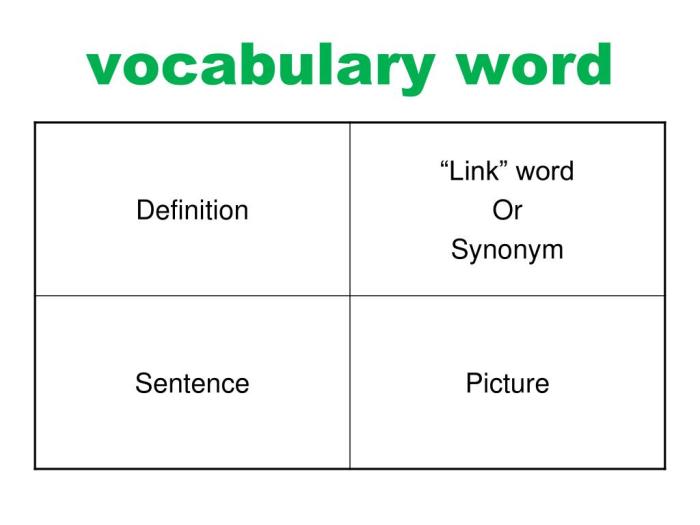
Understanding the relationships between vocabulary words is crucial for expanding your vocabulary and comprehending written and spoken language effectively. In Unit 2, we explore various types of word relationships, including synonyms, antonyms, homonyms, and more.
Synonymy and Antonymy
Synonymsare words that have the same or similar meanings, while antonymsare words that have opposite meanings. Identifying synonyms and antonyms can help you enhance your vocabulary and express yourself more precisely.
- Synonyms: happy, joyful, delighted
- Antonyms: hot, cold
Homonyms and Homophones
Homonymsare words that have the same spelling but different meanings, while homophonesare words that have the same pronunciation but different spellings and meanings. Understanding these relationships can help you avoid confusion and use words correctly.
- Homonyms: bank (financial institution), bank (side of a river)
- Homophones: their, there, they’re
Part of Speech Relationships
Words can also be related based on their part of speech. Nounsname people, places, things, or ideas; verbsdescribe actions or states of being; adjectivesdescribe qualities or characteristics; and adverbsmodify verbs, adjectives, or other adverbs.
- Noun: dog
- Verb: run
- Adjective: happy
- Adverb: quickly
Word Building
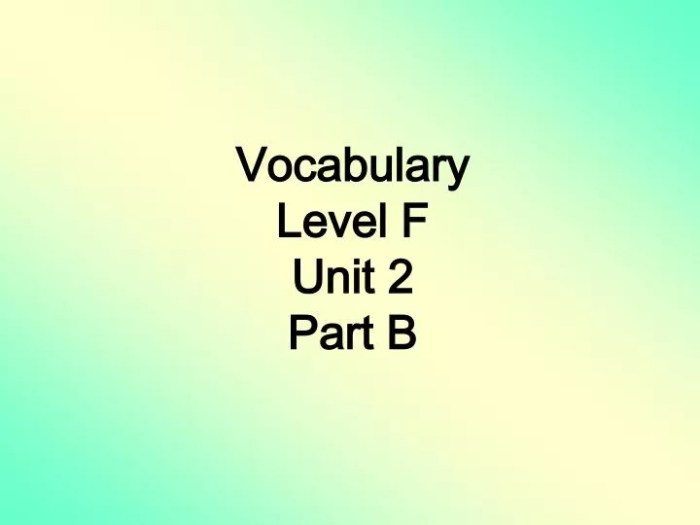
Building on the vocabulary from Unit 2, this section explores word roots, prefixes, and suffixes to enhance vocabulary comprehension. Engaging activities like crossword puzzles and word searches reinforce retention.
Crossword Puzzle
Complete the crossword puzzle using vocabulary from Unit 2. Across:
- A feeling of sadness or disappointment
- A large, heavy object
- To move quickly and easily
- A person who is always complaining
Down:
- To make a loud noise
- A small, round object
- To be very tired
- A feeling of happiness or joy
Contextual Understanding
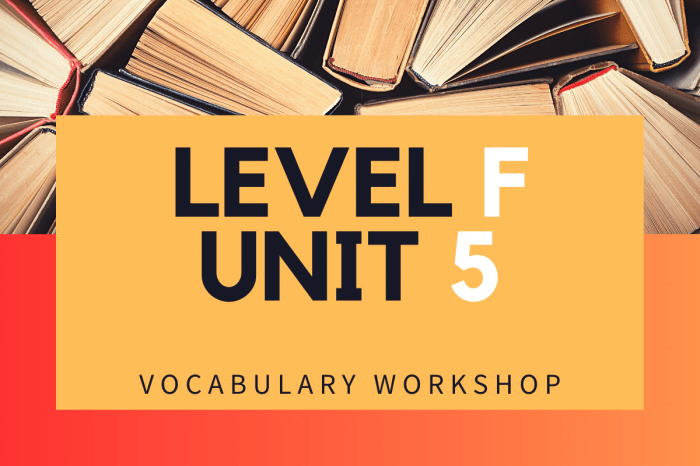
To strengthen students’ grasp of vocabulary, educators should incorporate activities that encourage them to employ these words in diverse contexts. This fosters a deeper understanding of the words’ meanings and their appropriate usage.
By presenting students with short passages or scenarios, teachers can prompt them to identify, explicate, or apply the vocabulary words. This encourages critical thinking and analysis, as students must consider the words’ meanings and their relevance to the given context.
Open-Ended Questions
Open-ended questions stimulate critical thinking and analysis. They encourage students to explore the vocabulary words from multiple perspectives, fostering a comprehensive understanding of their nuances.
For those who are looking for some extra help with Vocabulary Level F Unit 2, check out the Saxon Math 4 Answer Key . This resource provides step-by-step solutions to all the problems in the unit, so you can be sure that you’re on the right track.
Once you’ve mastered Vocabulary Level F Unit 2, you’ll be well on your way to becoming a vocabulary master!
- How does the word “connotation” contribute to the overall meaning of the sentence?
- Can you provide an example of how the word “juxtaposition” can be used to create a powerful literary effect?
- Explain how the word “ephemeral” differs from the word “temporary” in terms of its emotional impact.
Vocabulary Expansion
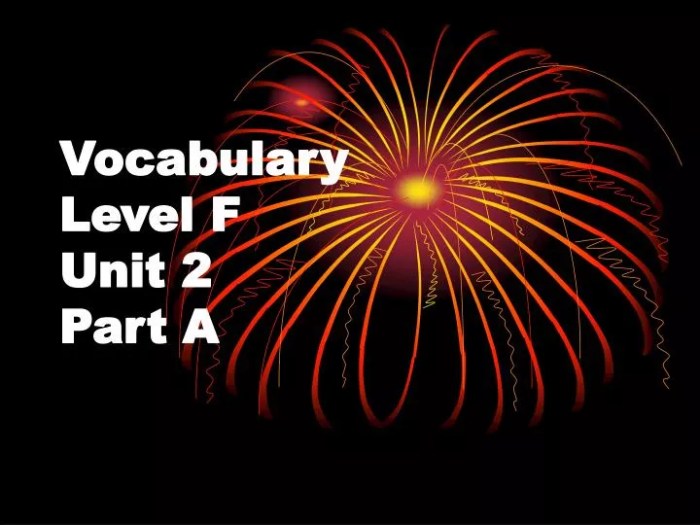
Expanding your vocabulary is crucial for effective communication and academic success. Beyond the confines of Unit 2, there are numerous resources and strategies available to help you enrich your word repertoire.
To broaden your vocabulary, consider exploring the following:
Books and Articles
- Read widely from diverse genres and authors. Novels, newspapers, and magazines often introduce new and sophisticated vocabulary.
- Utilize dictionaries and thesauruses to explore word meanings, synonyms, and antonyms.
- Subscribe to vocabulary-building apps or websites that provide daily word lists and exercises.
Online Platforms
- Engage in online discussions and forums related to your interests. This exposes you to a wider range of vocabulary used in specific contexts.
- Watch educational videos and documentaries that introduce new concepts and terminology.
- Participate in online vocabulary games and quizzes to test your knowledge and learn new words.
Incorporating New Words
To effectively incorporate new words into your daily language, consider the following:
- Use flashcards or a vocabulary notebook to review new words regularly.
- Make a conscious effort to use new words in conversations, emails, and assignments.
- Associate new words with familiar concepts or experiences to enhance your understanding.
Quick FAQs
What is the significance of Vocabulary Level F Unit 2?
Vocabulary Level F Unit 2 is a crucial step in expanding your vocabulary and enhancing your communication skills.
How can I effectively learn the vocabulary in this unit?
Engage with the provided examples, participate in interactive exercises, and consistently practice using the new words in different contexts.